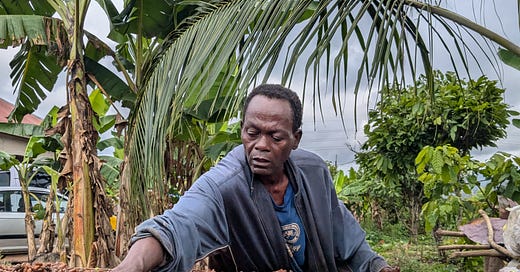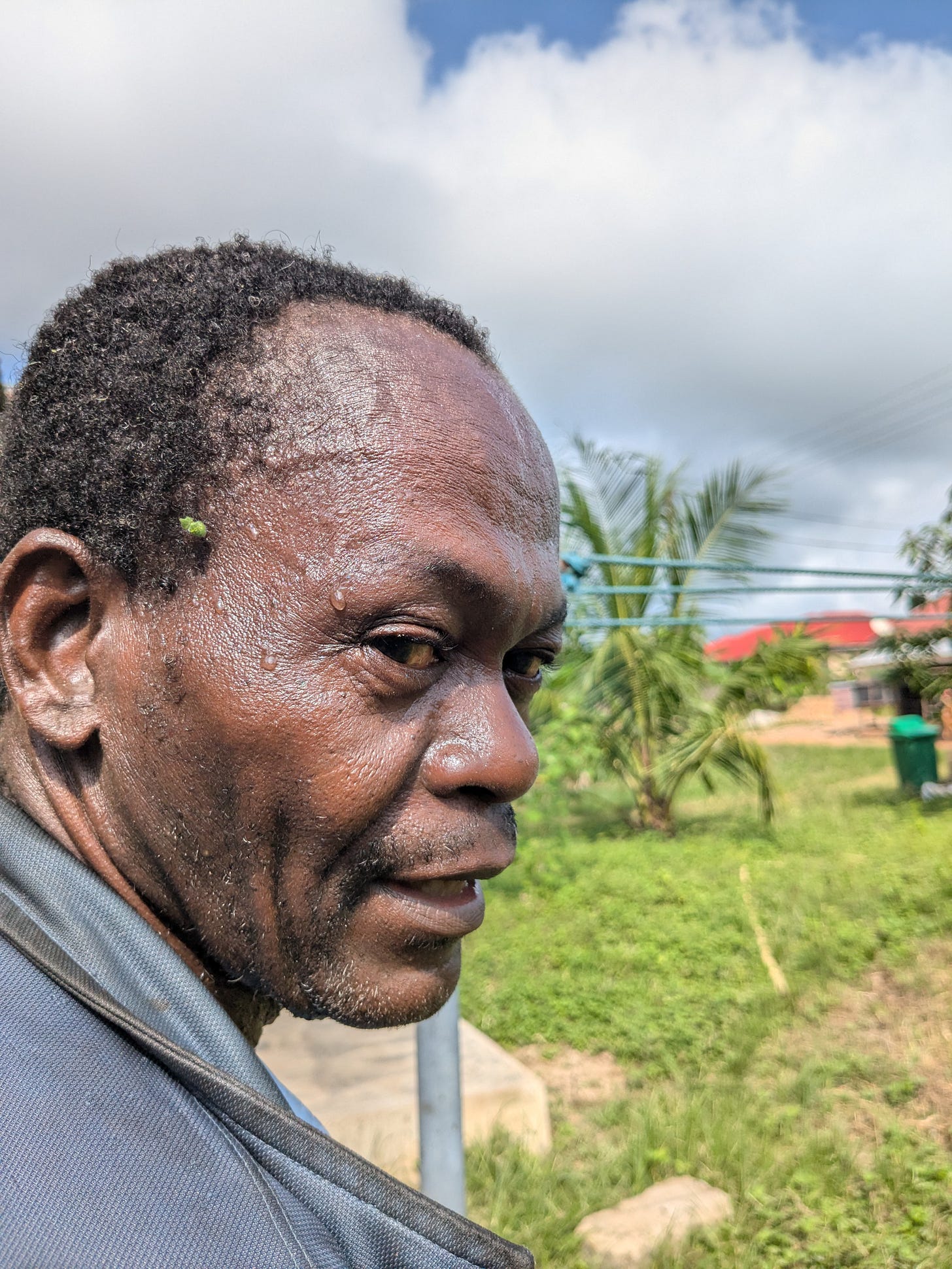How Spending Time with a Cocoa Farmer Changed my Approach to Storytelling
Listening beyond words.
When I first launched African Cocoa Stories, my approach to publishing stories looked something like this:
Record an interview with a farmer - take photos of them - listen to the recording - draft story - edit - publish.
As usual, the feedback was great! awesome! special! well-written! etc. The stories resonated with people in and outside the cocoa industry, and it felt good.
But, deep inside I wasn’t impressed.
My stories lacked depth. I wanted my readers to, not only hear a farmer recount their life story, but also see them in action; feel their excitement when cocoa money came; relate to their frustrations when the sun scorched too much, or when family responsibilities conflicted with cocoa farming.
My paragraphs couldn't make that happen.
Then came June, that time of the year in Ghana’s rainforest when the sun and the rain begun to push each other around. It would shine for 15 minutes, drizzle for 30 seconds, and just when the sun was getting back on stage, it would start to rain. Even the best weather apps couldn’t keep up.
By this time, my work contract had ended, so I had more hours to spare. Naturally, I decided to spend this time with cocoa farmers to enrich my knowledge of their farming activities.
Little did I know I was setting myself up for a big shift.
Across the street lives Mr. Acheampong, a 70-year-old cocoa farmer. In fact, from my house, I could even see the raffia mat on which he dried his cocoa beans.
One Monday morning, I saw the old man spread freshly fermented cocoa beans on his drying mat. He wore his usual blue t-shirt under his blue cardigan that looked too big for his small size. Did he have his blue wellington boots on? I think so.
I went out to him, shouting my greetings way before reaching his mat. I had no plan and no interview questions; just a desire to be with a cocoa farmer in his space, observe his work, lend a hand, and chat about anything that came up - including his work.
As his wet hands sorted out bad beans and took out placenta, he looked up at the sky and frowned: “This weather will really trouble me.” I looked up and noticed. At 9AM the sun still hid behind dark grey clouds.
“Why will the weather trouble you?”
I had my hypothesis. But his answer could reveal something interesting. I listened.
“Well, since I can’t tell when it will rain and I have no one to watch the beans, I can’t go out and do other things.”
That made sense. If he were assured of a full day of sunshine, he could leave his beans to dry while he went to do his rounds in town. Also,
“There’s a lot of pruning to do on the farm, but I cannot go and do it. I even have yam seeds under my bed. But I can’t go and plant them.”
His wife would have relieved him of this task, but she had also traveled.
“It’s so annoying.”
Suddenly, I was meeting this man for the very first time.
I could feel the effort it took for him to ensure chocolate makers around the world got Ghana's premium cocoa beans. And I could see the emotional rollercoaster that unpredictable weather could cause a cocoa farmer who had other things to do than watching cocoa beans dry.
As Mr. Acheampong’s hands continued to sort out foreign materials from his beans, it dawned on me: his work was more than cocoa farming. He was also a quality control officer who ensured his beans were of high quality, well-dried and rid of all foreign materials.
As I walked through the grass to my house, I shook my head and smiled. No interview questions, just random conversations plus deep observation. But I had learned so much about this farmer’s experience. I even had much more material for a story than I’d have gotten from an interview, although I didn’t record our interactions.
I sat down at my desk to examine the candid photos I’d taken during our chat. As I scrolled, I felt this sudden urge to do more of this. I wanted to be around this man more often. I wanted to hang out more with cocoa farmers.
It’s been four months since that conversation with Mr. Acheampong, and I’ve immersed myself even more in the world of several cocoa farmers. We have harvested cocoa together, hunted plantain leaves for fermentation, and sorted out foreign materials as the cocoa dried on the mat. I’ve even babysat their drying cocoa for them as they went to take care of other aspects of their lives. Never have I learned so much detail about cocoa farming.
And now, as I continue hunting for African Cocoa Stories, my storytelling approach has changed: a sit-down interview is only to get an overview of the farmer’s life.
After that, I zoom into their story by hanging out with them in different spaces. And each time, I uncover something new in their relationship with this crop called cocoa.
Thanks for reading this. See you in the next one.







"his work was more than cocoa farming"
You craft this story so well, and give me intense respect for every bite of chocolate I now but in my mouth. It is experience like this that teaches us not to waste.
Also got to call out this para for its intense beauty:
"Then came June, that time of the year in Ghana’s rainforest when the sun and the rain begun to push each other around. It would shine for 15 minutes, drizzle for 30 seconds, and just when the sun was getting back on stage, it would start to rain. Even the best weather apps couldn’t keep up."
I grew up in Uganda, so this brings back memories!
“Why will the weather trouble you?”
I had my hypothesis. But his answer could reveal something interesting. I listened.
“Well, since I can’t tell when it will rain and I have no one to watch the beans, I can’t go out and do other things.”
I felt the heaviness of this. Going out and having conversations in situ is so valuable. Beautiful work you're doing, Benjamin